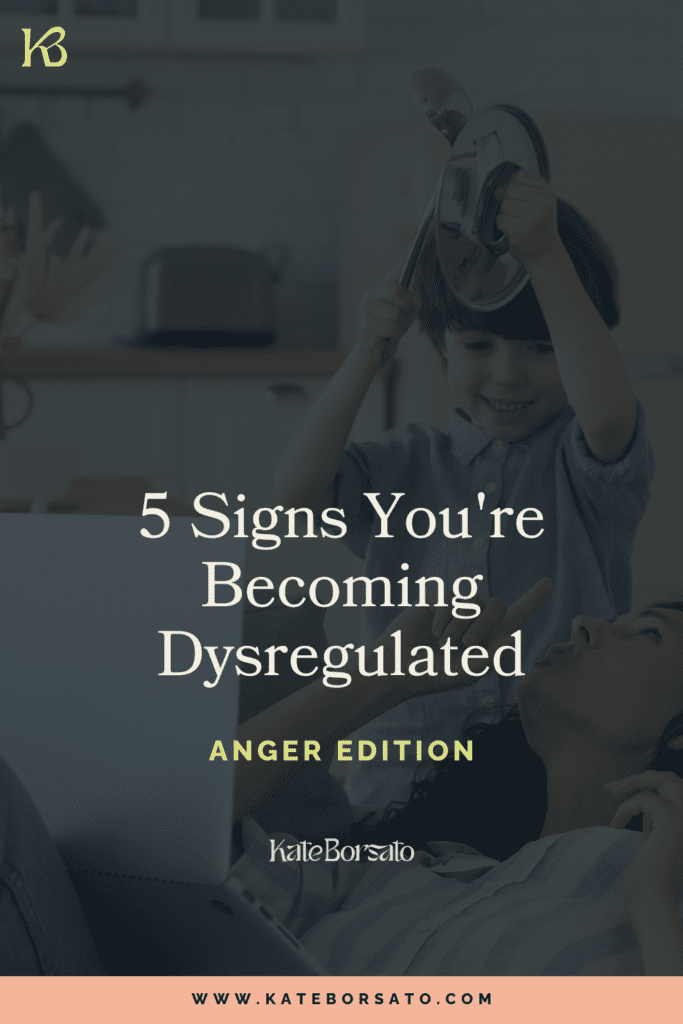The problem isn’t anger. The problem is when you don’t know why you’re feeling it, or can’t shake it. The problem is the actions and guilt that follow.
Anger is an emotion that many of us can have a hard time expressing. Women especially can feel guilty about both experiencing anger and letting it show. We’re socialized not to raise our voice, complain, show when we’re mad, or lose our tempers.
But… that’s pretty limiting, isn’t it? I always remind therapy clients that we, as human beings, are supposed to feel the full range of emotions. It’s normal, natural, healthy, and just part of the human experience.

We don’t question “positive” emotions like happiness, excitement, sadness, or contentment. But anger? Rage? Frustration? We *love* to judge and criticize those ones don’t we? We have to remember that motherhood is an imperfect journey though and that self-compassion is key. And, we are human.
But first let me reassure you that literally everyone has moments where they snap, let frustration get the best of them, or have a fight with a loved one. We slip up and yell at our kids, get short or snippy with our partner, or respond in a way that we’d rather not.
I’m not going to try to convince you to love this part of you, or that it’s okay to lose your sh*t at your kids. Most people already feel badly about this.
However, I am going to tell you over and over again that it’s normal to feel big emotions, and that there’s a lot that you can learn to regulate yourself so that even when you’re pissed right off about something, you still feel good about how you behave. Sounds good?
So, to start, what would happen if you could get curious about anger instead of judging it and then feeling guilty? A lot of the time our emotions are actually trying to tell us something. In the case of frustration or losing your temper, your emotions may be a cue that your nervous system is dysregulated. Or about to be. Okay, so what does that mean exactly?
The nervous system: The cliffs notes
You can’t understand nervous system dysregulation if you don’t know what the nervous system is and what its functions are. Seriously, there are entire books on this stuff and could (and will) fill several blog posts and courses. For the sake of keeping things to-the-point and brief though, here’s what you need to know…
Your nervous system is responsible for your threat-detection and threat-response, essentially in charge of keeping you (and your loved ones) safe. Your brain and body work together to detect when there’s danger or a threat. When there is, you’re primed to react accordingly. It’s a survival and protection mechanism.
You may not be aware of it (or maybe you’re painfully aware!) but you are constantly on the lookout, scanning for potential harms and sorting through information presented to you throughout your day. This is almost like a watchman keeping an eye on everything from a guard tower.
The problem? Sometimes your nervous system is working too hard and starts to sound the alarm at every little thing. Sometimes it also perceives everyday stressors as a threat and goes into overdrive. In other words, you’ve passed through your window of being able to manage the stressors, and your system kicks you into high gear (learn more about the window of tolerance here).
When you no longer feel calm, present, and in control, your nervous system becomes dysregulated. It’s when the stress becomes too much. When your nervous system is dysregulated, you feel overwhelmed, not in a calm state, unable to tolerate certain stressors… or really freaking irritated.
This is when you snap, yell, rage cry, or feel stressed beyond what would be understood as normal stress. Sometimes people also completely withdraw, shutdown, get really quiet, and avoid the situation that’s causing stress.
Still not sure what this feels like?
Here are five common signs that your nervous system is becoming dysregulated:
1. You’re short tempered.
This is that state when everything just makes you want to crack! You’re about to snap, yell, hit back with a sassy comeback or straight up flip out. You might also recognize that the way you’re feeling is out of proportion to the trigger. For example, your partner asking you to repeat yourself, or your kid literally spilling milk isn’t logically cause for a meltdown is it? Probably not. But when your nervous system is dysregulated, you’re not tolerating stress in a normal way. If you’re always on edge and irritable, this is a nervous system red flag.
2. Noise is driving you nuts.
You hear the microwave beep for longer than necessary. The song on the radio is annoying. The stove top fan is on, your kids are bickering, and OMG the notifications going off on your phone are driving you nuts! Okay so feeling overly sensitive to noise is a really really big sign that you’re becoming dysregulated. If you start to notice normal everyday sounds just driving you nuts, it’s time to implement some self-regulation strategies.
3. Normal child requests feel annoying.
Your reaction to your child’s needs is often a telltale sign that you’re becoming dysregulated. Sometimes even the simplest requests can just feel like such a burden but you don’t know why. Your kiddo might be in a curious mood and asking lots of questions. Or she’s sick and has (understandably) needs beyond what a regular day would include. You’re dealing with scraped knees after a fall on the bike, food pickiness or tears. For some reason it’s all just feeling like a huge burden and it’s making you irritable. That’s because your nervous system is dysregulated and perceiving normal things as a threat or even an attack.
4. Your space feels chaotic and it’s triggering.
Alright, picture this scenario. You wake up in the morning not feeling totally rested despite having had a decent sleep. You come down to your kitchen to make your coffee and… last night’s dishes are sitting in a mess. Your living room is a little disorganized. There are stacks of papers on the kitchen table, clutter on the counter, and the floors could use a good sweep. This makes you want to scream, cry, or both! Our living spaces can have a huge impact on mental health. The old saying, “tidy house, tidy mind,” as annoying as it is, is kind of true. Your reaction to a messy space can also be a sign that you’re becoming dysregulated. If last night’s dishes are the last straw and cause you to crack, you’re going to need to self-soothe or direct intense energy elsewhere in order to calm your nervous system.
5. You want everyone to leave you alone!
Oh gosh, that feeling of wanting to hide from the entire world and have everyone just leave you the heck alone is such a common symptom of nervous system dysregulation. That reaction when your child is asking for help with something while your partner is trying to confirm plans for dinner as you’re catching up on morning emails… it can feel like a lot when you’re becoming dysregulated. It’s so common that we snap for ”no reason” at these moments. If you just want to be by yourself and “hide” you’re probably in need of some grounding, connection, and calm moments in your day. You’re allowed to ask for this space!
How to regulate your nervous system when you’re angry
As mentioned, both the nervous system and nervous system regulation are huge topics worthy of textbooks and courses. For our purposes here, I’m only talking about one small sub-topic under this umbrella: nervous system dysregulation and anger.
If one, some, or all of the above feel familiar, you’re going to want to explore ways to regulate your nervous system. Or, in other words, bring yourself back into your window of tolerance so that you can feel calm, able to go on with your day, and back to normal.
Now, something to know is that not all methods of nervous system regulation are created equal. This blog post is about managing anger. When you’re about to lose your temper or you’re constantly irritable, subtle ways of regulating your nervous system (like breathing exercises or tuning into surroundings and senses) might not work as well. You need methods that will match your current energy (big energy might need a big response).
Below, I’m listing five ways to regulate your nervous system when you’re really freaking mad!
- Exercise. Intense emotions call for an action that’s on the same level. A burst of vigorous exercise is probably the best thing that you can do to move this angry energy along and complete your stress response. Think a run, a HIIT workout, a brisk walk, or a weight session
- Flutter lips. Fluttering lips (think horse lips where you flap your lips audibly as you exhale) is one of the common nervous system regulation tactics because it stimulates your parasympathetic nervous system and essentially tells your brain that you’re safe. This quick tool is completely accessible. You can literally do this anywhere—be it at your desk, while cooking dinner or when driving with a crying child in the car.
- Shake it out! Again this is about giving that intense energy somewhere to go. Shake your arms, your legs and just move in whatever way your body is asking you to. Turn up the music and turn it into a crazy dance party for a few songs until you start to come down from big emotions.
- Butterfly taps. Cross your arms over each other and begin tapping underneath your collar bone. You can start off with quicker, more intentional tapping and ease up to gentle taps as you feel yourself regulate and come back to a calm state. ALthough this tool can feel a bit woo-woo, it’s actually science-backed (tapping offers bilateral stimulation, which helps regulate your nervous system).
- Sing. When you stimulate your vocal cords, you’re activating your parasympathetic nervous system by vibrating up against your vagus nerve. This can be done by humming as well but when you’re angry, irritated and about to snap (or have already!) you need a bigger response. Close the door, turn up the music and just belt out the tunes. In a few minutes, you’ll notice that you physically are starting to feel better.
I want to remind you again that anger and irritation are natural emotions that we all feel from time to time. If you’re tempted to judge yourself for feeling irritated by your kids or partner, remember that it’s literally impossible to go through life without feeling this way. We can’t show up in exactly the way that we want to in every moment of every single day. Sometimes we snap or storm out of the room.
Remember this: the problem isn’t actually the anger. You’re not an angry mom and you don’t have a rage problem. The problem is how you deal with or express the anger, and if you’re feeling like it’s coming out in ways that aren’t aligned with how you want to be as a parent. Learning self-regulation tools is what will help with this.
After reading this post, do you have a better idea of how anger is a symptom of nervous system dysregulation? Next time you feel that sense of anger bubbling over, will you be able to ask yourself what your anger is trying to communicate? I’d also love to know which of these nervous system regulation tips worked best for you.








Comments +